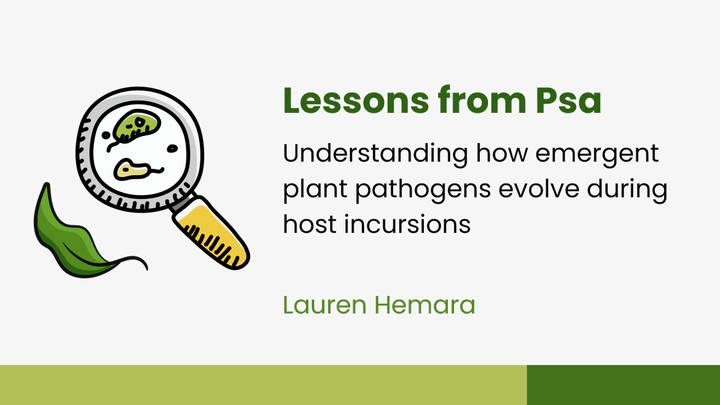Lessons from Psa: Understanding how emergent plant pathogens evolve during host incursions

Abstract
In 2010, an incursion of Pseudomonas syringae pv. actinidiae (Psa) in New Zealand devastated kiwifruit orchards growing susceptible Actinidia chinensis var. chinensis cultivars. The kiwifruit industry has since recovered, following the successful deployment of the new gold cultivar ‘Zesy002’. However, little is known about the extent to which the Psa population is evolving in orchards and adapting to its kiwifruit hosts. Effector proteins help pathogens invade their host, extract nutrients and suppress immunity. Psa is a recently emergent kiwifruit pathogen with over thirty functional effectors, providing a unique opportunity to understand how host selection shapes pathogen evolution. In particular, we seek to understand whether plant pathogens require all of their effectors to cause disease. Recent research suggests that only a few Psa effectors are required for virulence. Further still, resistant kiwifruit hosts such as Actinidia arguta can recognise several Psa effectors. Why, then, does Psa retain so many effectors in its repertoire? Using complementary approaches of orchard-based genome biosurveillance and effector knockout strain competition, we seek to examine effector requirements, redundancies, and repertoire refinement across different kiwifruit hosts. The selective pressure exerted by serial passaging a competitive pool of effector knockout strains in planta has allowed us to detect subtle contributions of effectors to virulence. While the majority of Psa’s effectors previously appeared to be non-essential, competition results suggest they may be collectively required for successful virulence. Competition has also revealed previously unknown host-specific effector requirements. This research provides important insights into the evolution of recently emergent pathogens and will ultimately inform robust resistance breeding efforts to manage pathogen outbreaks sustainably.